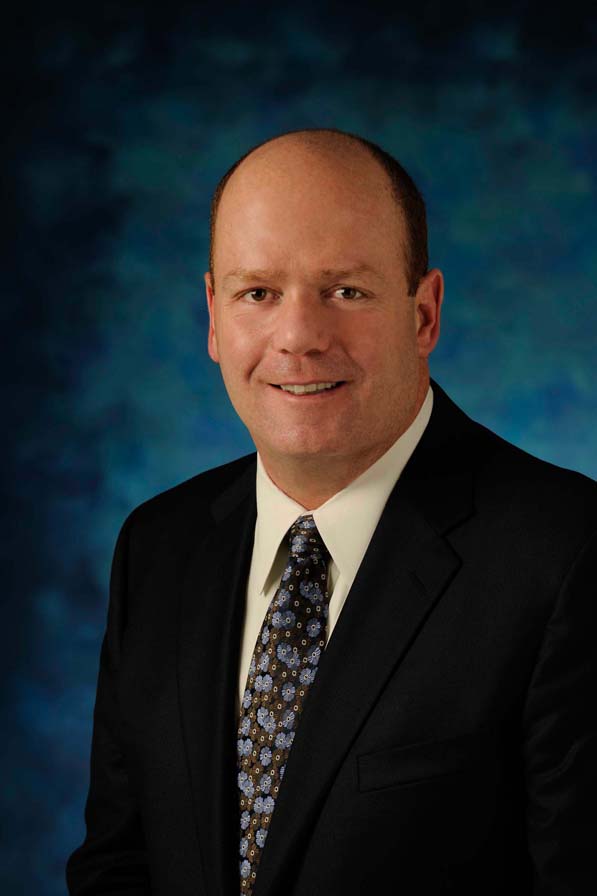
In the often turbulent oil and gas industry, playing it conservative is the game plan for Baker Hughes CFO Peter Ragauss. “I’m the de facto steward of our resources, capital, and balance sheet,” he says. Photo: Ken Childress.
Amid headlines about gas prices, oil company profits, and energy demand—all of which are rising—it’s plain to see: energy creates wealth. A few minutes into a conversation with Peter Ragauss, however, one realizes that the reverse is also true: before oil makes money, it’s money that makes oil.
“Think about what it takes to develop a decent-sized oil field,” says Ragauss, senior vice president and CFO for Houston-based Baker Hughes Inc., which supplies oil field services, products, technology, and systems to the oil and natural gas industries. “First, it requires economically risky exploration. Then you’ve got to drill wells, and build pipelines and everything else to carry the product to market. A 30-year project is cash flow-negative for the first 10–15 years of its life. That’s billions of dollars up front before you see any return.”
In other words, oil drilling is just as expensive as it is profitable and just as risky as it is lucrative. To continually match demand with supply, oil companies must funnel a constant stream of cash from producing properties to exploration properties. Along with the engineers who extract it, therefore, the financiers who fund energy are critically important.
“Many oil and gas companies spend more than their cash flow in a given year, so they’re always talking to lenders and investors,” Ragauss says. “As a result, their CFOs are very active; they have to understand the story and sell the story to raise the capital that’s needed to grow the business.”
The son of a cabinetmaker, Ragauss has been “raising capital” his entire life. “I grew up in a pretty modest place under pretty modest means,” says Ragauss, who had a paper route when he was 12, worked in a pizza parlor all through high school, and earned extra income playing billiards in his hometown of Grand Rapids, Michigan. “My parents didn’t have any spare money, but I always had good pocket money that I earned myself.”
Although he got his bachelor’s degree in mechanical engineering, and flirted with the idea of becoming an attorney, Ragauss’s dedication to work and money ultimately evolved into an interest in business. After a brief career as a sales engineer, he applied to business school, ultimately graduating from Harvard Business School in 1987.
“After business school I managed to land a job with one of the smaller investment banks, Kidder, Peabody, which was really active in corporate finance and mergers and acquisitions for energy companies,” Ragauss says—and he has been an oilman ever since. “Energy was one of the biggest income sources for investment bankers, and still is to this day. That’s how I got involved in energy.”
Ragauss spent nearly six years at New York-based Kidder, Peabody. Because most of his clients were in Houston, he moved there in 1990 when the firm opened a Houston office. “Having seen all the activity in Houston, it seemed like a good move,” Ragauss says. “Houston has more public companies than any other city in the country, except New York, so there’s plenty of opportunity. It seemed like a good place to build a career.”
That career took Ragauss to auto-parts supplier Tenneco Inc. from 1993 until 1997, then to Amoco in 1998—eight months before it sold itself to British oil titan BP. Even before the sale closed, he was the first Amoco employee invited to move to London. “I worked at BP until 2006, which is when I was contacted by Baker Hughes,” Ragauss recalls. “They were looking for a CFO, and I knew I eventually wanted to get back to Houston. This was the perfect opportunity, so we picked up everything and moved back.”
Founded in 1907 by Howard Hughes Sr.—the famous aviator’s father—Baker Hughes developed the oil industry’s first two-cone drill bit. Ragauss manages a finance group of approximately 2,000 employees at the company, with responsibilities ranging from accounting, external reporting and internal control to investor relations, tax, and treasury. His job is a crucial one, as the company continues its historic legacy by drilling oil and gas wells for the world’s largest energy companies.
Getting to Know
Peter Ragauss
Profile: What motivates you most in life?
I live by the Boy Scout motto, which is to do my best. Life isn’t about money or fame. It’s about doing your best and being recognized for being good at something.
Profile: Which part of your job could you live without?
We could all live with fewer and shorter meetings. Meetings are bad for your creativity, bad for your health, and bad for your back.
Profile: Where do you see yourself in five years?
Still working. My youngest kid’s got 10 years before he’s off to college, so hopefully I’ll be gainfully employed at least until then.
Profile: How do you overcome stress?
I exercise. I like to mountain bike, I’m asking my wife to get me a road bike for my birthday, and I’ve got a rowing machine. It’s the only tried-and-true method that works for me.
Profile: What do you value most in your colleagues?
Authenticity and honesty. In finance, you can’t make progress until you look at the brutal reality of the facts. Other functions value creativity, but in my function that’s the last thing we need.
Profile: What is your personal motto?
Tell it like it is.
Profile: What’s your best advice to work by?
Exceed your boss’s expectations.
Profile: Who are your heroes?
I’ve worked for some pretty high-profile executives, and there’s no such thing as a hero when you really get to know them. They’re human. Strong people have strong weaknesses. I’ve seen it.
Profile: What do you consider your greatest achievement?
My goal is to have two happy, well-adjusted, accomplished kids. They’re still young, so we’ve still got about 10 years to see the results, but that would be the accomplishment I would truly cherish.
Profile: If you could change one thing about your industry, what would it be?
I think energy could and should garner more respect. We’re the Rodney
Dangerfield of industries. There’s reasons for that—maybe we don’t do a very good job explaining ourselves, maybe people feel powerless about the price of gasoline—but I think the energy industry is very efficient and competitive. It’s not a bloated industry, and I think people often forget that.
“We provide the ability to drill into the earth for miles, measure the oil and gas that’s there with our sensors, and then get the oil out of the ground reliably,” Ragauss says. “I’m the de facto steward of our resources, capital, and balance sheet. We’re in 90 countries and have eight product lines, all requiring capital. It’s my job to guide the business on where and how much to invest in those various geographies and products.”
During his seven-year tenure, Ragauss has helped Baker Hughes grow its quarterly revenues from approximately $2 billion to more than $5 billion. “We completely reorganized the company from seven fiercely independent divisions to a geographic operating structure,” he says. “We rewired all the roles and financial reporting systems within the company. And on top of that, we completed the second-largest merger in the oil-field services business—the purchase of BJ Services in 2010, which was a $6.9 billion deal. I had a major role in all those developments.”
Ragauss has also had a major role in streamlining the company’s operations, which keeps Baker Hughes competitive. “Our customers beat us up pretty hard to keep our costs down,” Ragauss says. “If they can save 10 percent on a $100 million well, that’s real money. So, we have to constantly chase efficiencies. We, like many, have moved manufacturing to lower-cost locations, consolidated suppliers, and redesigned many of our factory floors to be more efficient. We’ve taken hundreds of millions of dollars out of our supply-chain and back-office costs.”
Ragauss spends as much time on strategy as he does on streamlining, which gives him a unique perspective on some of the world’s most pressing energy issues, not the least of which is supply and demand. “We’ve got cheap and abundant natural gas now, and for the first time in decades we’ve had rising US oil production, all coming out of the shale plays in North Dakota and the Eagle Ford in South Texas,” he says. “That’s the most rapid shift of anything that’s occurred in the last few years. Other sources of growth are Brazil, Angola, and Iraq. These provinces are taking off as we speak. All this is to say, global supply still has room. It’s getting more expensive to drill, but the resource is there. On the demand side, it’s true that mature economies like Europe and the US are seeing oil consumption fall, but that’s being offset by China and India. Those countries are massively short on energy, and they’re going to find a way to get it.”
That there’s still plenty of supply and lots of demand means alternative energy is a long way from replacing fossil fuels. “There are positive developments in renewables and other sources of energy, but their costs are still too high and their production rates too low,” Ragauss says. “I don’t see them making economic breakthroughs, at least for the next decade or two. They’ll grow, but they’re still a very small slice of the energy-supply pie.”
Ragauss has seen with his own eyes just how big that pie is, and it’s his job to cut Baker Hughes as large a piece as possible. “There’s oil all over the world,” he says. “Some of it’s in easier places, some in more difficult places, but it’s all over. Take Iraq, for instance. We had the Iraq war and now it’s open to investment with enormous reserves. It’s my job to figure out how much we’re willing to risk in what is clearly a very risky place. There are no easy answers, but it’s what CFOs do every day of the week.”

